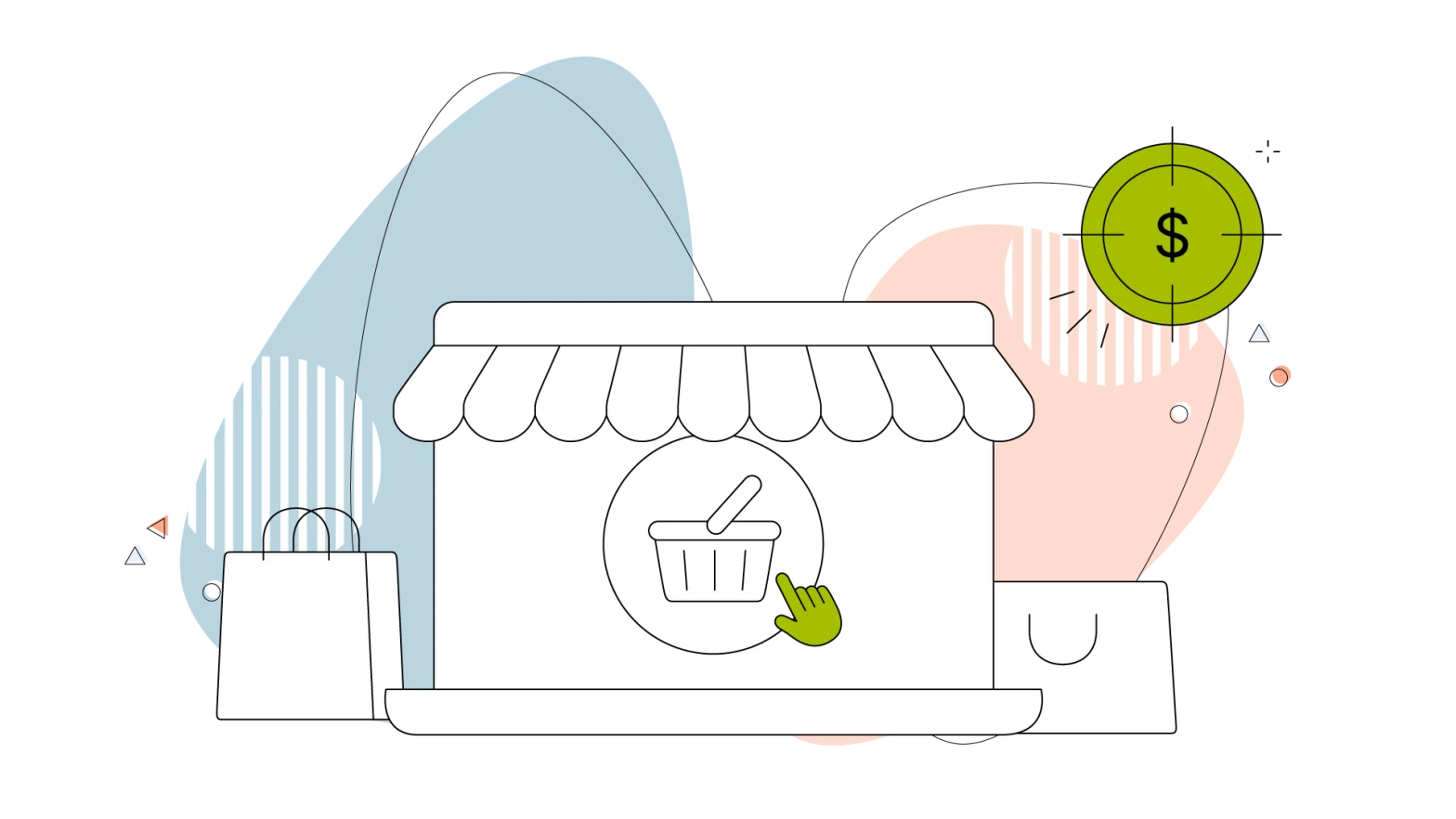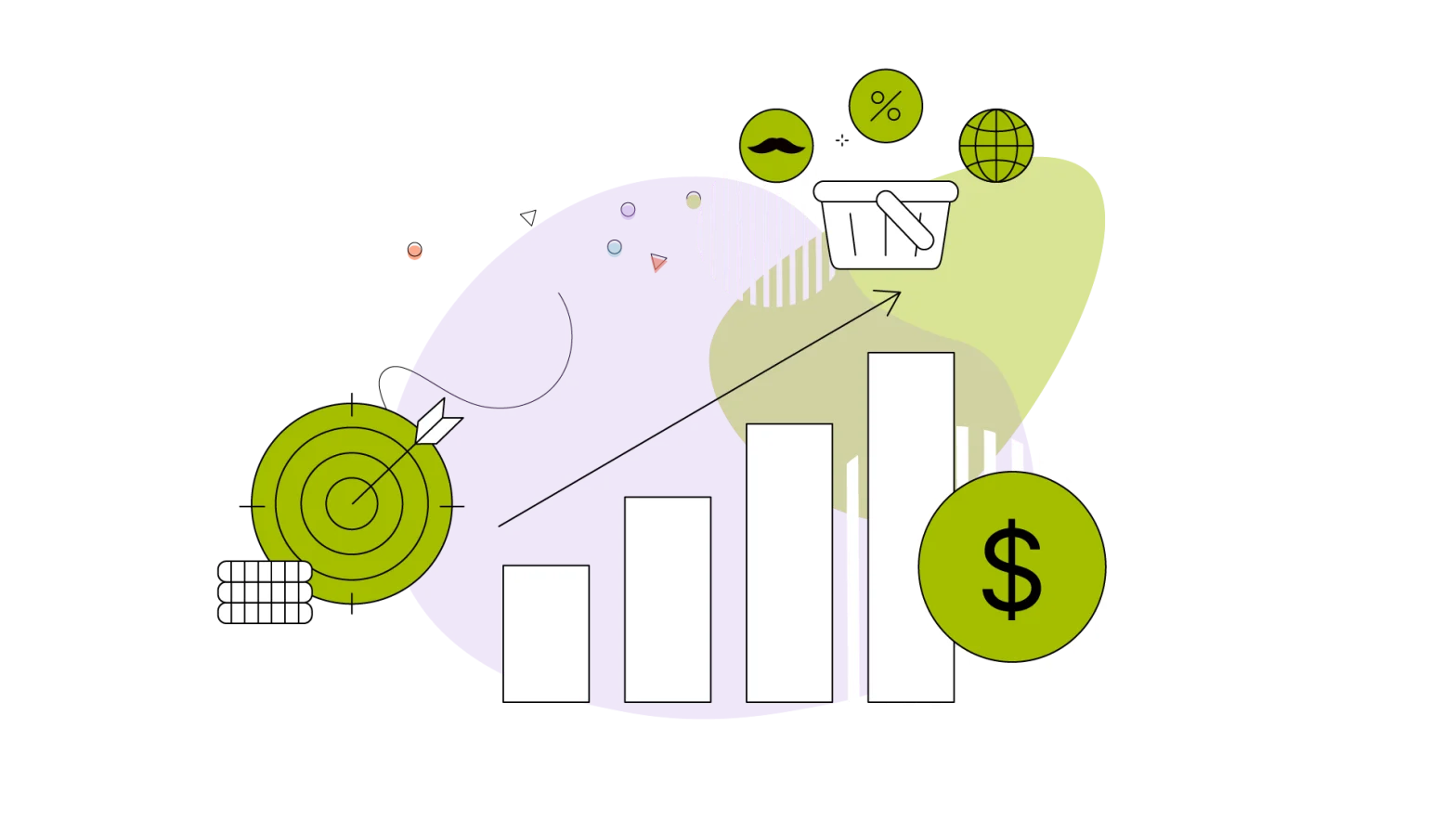Everyone’s heard of copyright, but because it’s not always fully understood, applying it to the contents of a website can be especially confusing.
This article will explain what copyright is and discuss whether it should concern you as a website owner. We’ll offer some practical advice on how to protect your website and wrap up with information about what you should do if your copyrighted material is used without your permission.
Compared to other aspects of domain management, dealing with copyright may be somewhat mundane, but it does deserve your attention. So, for an easy-to-digest take on a topic that’s usually riddled with legalese, please read on!
What Is Copyright?
Copyright law exists to grant authors and artists exclusive rights to their output. It’s a broad legal doctrine that was created to foster the creation of art and culture. It gives authors and artists the exclusive right to make and sell copies of their works, to create derivative works, and perform or display their works publicly.
The U.S. Copyright Office states that copyright protection applies to “original works of authorship,” including literary, dramatic, musical, artistic, and certain other intellectual works.”
You may be thinking, “OK, cool, but copyright doesn’t apply to me…my site doesn’t have any content like that.”
Think again. You probably authored a good amount of the text on your site, or you had it created on your behalf. That means it’s yours, at least in terms of copyright, along with other visual elements of your site. It makes sense to protect that content as you would any other business asset.
How Copyright Applies to Websites
Your website, as original work, is copyrighted upon creation because a website, by definition, satisfies the requirement that the material is “fixed in a tangible medium of expression.” In essence, that just means the content must be documented or communicated in an observable way, such as printed on paper or saved on a hard drive.
All the content of a website is protected by copyright. According to copyright law, that includes any “material that is perceptible to the users of a particular website,” so it pertains to text, images, music, audio, and video.
The contents of your site are copyrighted as soon as you publish it, but it’s smart to explicitly tell users that it’s copyrighted. A copyright notice at the bottom will do just that, and it’s one of the ways you can put copyright protection to work for you. It states that the content cannot legally be used without permission of the owner.
That word, “owner,” raises a new question. Who owns copyrighted material?
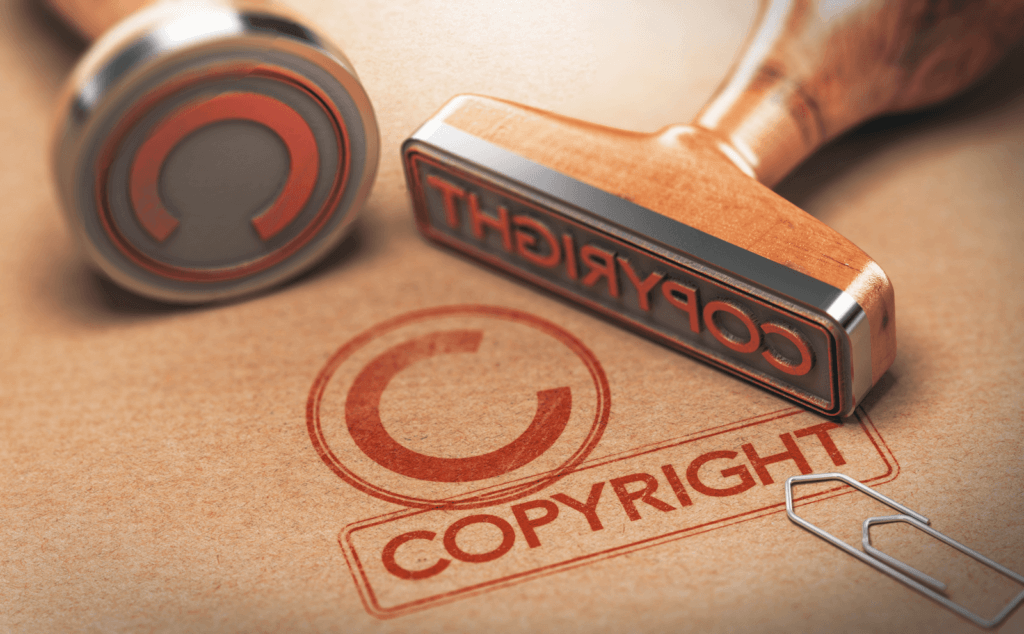
Who’s the Copyright Owner?
The creator owns the rights, but if the work was done in a “work for hire” situation, there may be an agreement in place that grants ownership of the work to the client.
If you employ someone directly and that person creates content for your site, your business owns the copyright. An independent contractor, on the other hand, owns the material they create, and you should have an agreement to reserve exclusive rights to use the material.
If your site has a comments section or you display user ratings, that’s third-party content, and it’s owned by the user who created it. If you wanted to include such content in your registered copyright, you would have to transfer ownership to yourself by requiring that users agree to your terms of service. In the application for copyright registration, you can then truthfully indicate that ownership of the third-party content has been transferred to you.
Does Copyright Extend Internationally?
Copyright does not guarantee worldwide protection, but copyright treaties do provide protection in participating counties.
The US and Canada have copyright relations with each other and most countries. You can visit www.copyright.gov to get more details; it’s a great source for official information about which countries adhere to international copyright treaties and conventions for foreign works.
Now we’ve examined how copyright pertains to websites, but does every site owner need to worry about it, or are there exceptions? Let’s find out in the next section.
What Kind of Websites Should Protect Their Content?
It’s hard to imagine a site owner who would permit someone to use their content without authorization. On the contrary, most site owners regard their content with a strong sense of personal ownership. That can be due to the pride that a creator feels in their work, or because of the value the content has for the owner’s brand.
Copyright infringement does occur, and it happens to businesses of all sizes. When a company’s content shows up on another website, it can damage the content owner’s brand reputation, dilute their marketing efforts, and confuse customers and prospects.
Later in this article, we’ll discuss exactly what you should do if someone infringes on your copyright, but for now let’s look at the steps you should take to copyright your website.
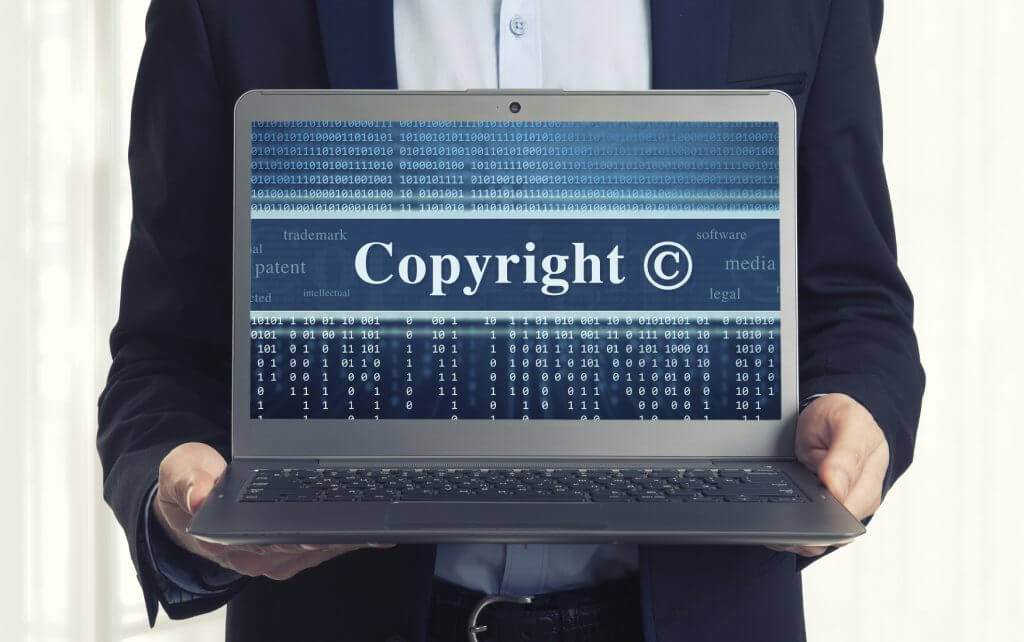
How to Copyright Your Website
As mentioned above, your website is copyrighted upon creation, but there are things you can do to get the greatest value from that protection. One, displaying a copyright notification, is a preventative measure, while another, copyright registration, is done to support legal action if it’s ever required.
Below we’ll go into more details about copyright notification and registration.
Copyright Notification
Displaying a copyright notice on your site will let readers know that you claim ownership of the material and that it’s not OK to use it without your permission.
Seeing a copyright notice at the bottom of a web page is quite common. Putting the notice on your home page is sufficient, but you can also add it to any other pages you want to.
A copyright notice should have the copyright symbol or the word “Copyright,” followed by the name of the copyright owner, and the year of first publication, like this: © 2017 John Doe.
You can find more details on the subject in a handy publication titled Copyright Notices.
One fact that’s covered in that document is that you don’t need to display a copyright notice in order to claim copyright ownership. The legal requirement to display a notification was eliminated in 1989. The main purpose of a copyright notification is to act as a deterrent against infringement.
It’s also important to note that placing a copyright notice on a work is not a substitute for registration, which leads us to our next topic.
Copyright Registration
The only way to be fully protected against copyright infringement is to register your copyright.
In the United States, it’s done through the US Copyright Office. You have to fill out an application, pay a non-refundable fee, and provide the content you want to protect. The content is given in a non-returnable “deposit”, defined as the entire work to be copyrighted. This can be all or part of your website, and it can be provided on a CD.
The registered copyright applies to works included in the deposit. Anything you add to the website after registering the copyright will not be considered part of the registered content.
The US Copyright Office will issue a certificate of registration. That provides a public record of ownership, and, as we were saying before, registration is required before you can file an infringement suit in court. For the copyright holder, registration is the most powerful part of the legal doctrine that defines copyright because it allows for “statutory” damages.
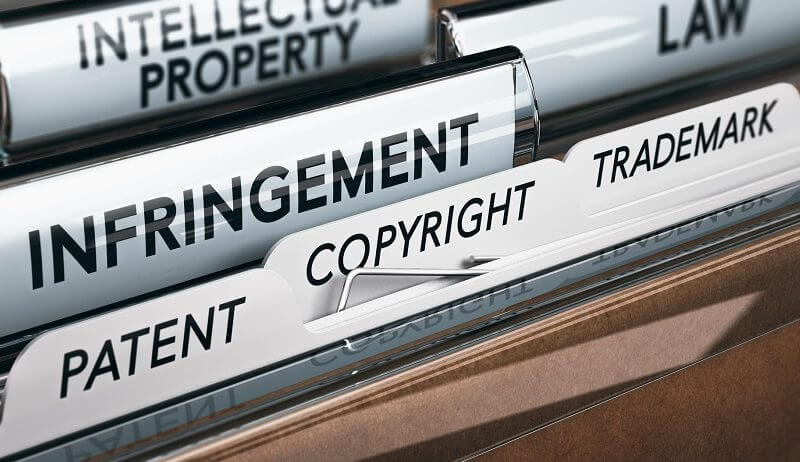
How to Respond to Copyright Infringement
Copyright infringement happens when a person or organization violates one of the exclusive rights identified by existing copyright laws. That is, they create and distribute a “copy” of your content that’s “substantially similar” to the original version.
If you discover your copyrighted material is being used in an unauthorized way, there are steps you should take, the first being to send the infringer a letter.
For documentation purposes, start by securing the original work and a copy of the publication that has used your content without consent. Then, write and mail a cease and desist demand letter.
The letter should go to the offending party and be written using your company letterhead. With an approach that’s authoritative but non-accusatory, your goal is to simply notify the offender of the transgression.
Once you open a line of communication, you can find out if the plagiarism was intentional or accidental, and, more importantly, compel the infringer to remove their copy of the content. If a cease and desist letter doesn’t work, you may have to take legal action, but you can only file an infringement suit if the copyright for the stolen content is registered.
Remember that only the content that existed at the time of registration is considered part of the registered content.
Websites change all the time, but not every part of your site needs to have the full protection provided by copyright registration. You can register just the content that is most representative of your company’s identity and unique value proposition. In doing so, you’ll be protecting your most enduring branding elements, while more transient pieces of your content will be less protected.
Your Home page, About Us, and maybe your Products or Services pages are the ones that most probably include your value proposition and brand promise, so protecting that content more than other types of material on your site makes the most sense.
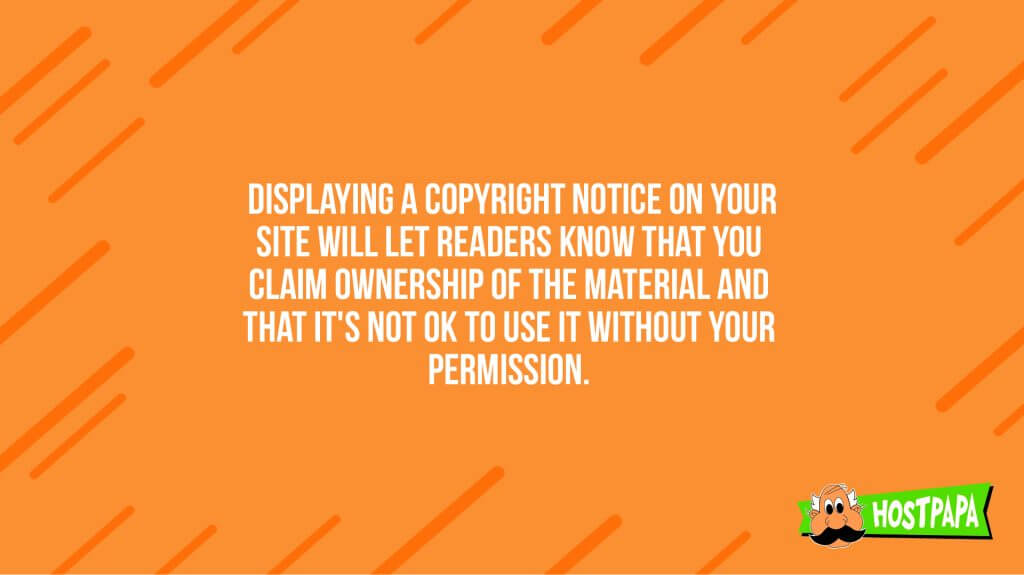
Let’s say you own an eCommerce website. If you register the copyright early and again any time your main branding content changes, you’ll be in good shape. Your latest, perfectly worded product description may not have a registered copyright, but the website content that’s most important to your brand will.
Now, there’s one more wrinkle when you’re dealing with copyright law. There are some confusing stipulations about the timing of copyright registration relative to an infraction.
To paraphrase a rule that’s explained fairly well in the government-published Copyright Basics document, you can seek statutory damages and attorneys’ fees if the infringement started after the effective date of registration. But…and this is a big but…there’s a grace period of three months after publication during which “full remedies can be recovered” (i.e., statutory damages and lawyer’s fees) if registration is made before the end of that period.
If you do sue over copyright infringement, you’ll be asking the court to issue orders to prevent further violations, award money damages if appropriate, and possibly award attorney fees.
The alleged infringer could claim their use of the material was innocent, perhaps with a fair use defense; US Copyright law allows the use of a copyrighted work “for purposes such as criticism, comment, news reporting, teaching (including multiple copies for classroom use), scholarship, or research.”
In another strategy, a claim of independent creation, the defendant would assert that their work is suitably different from your content. Or, the infringer could try to use a lack of originality defense, stating that the copyrighted material, itself, was not “original.” Another copyright infringement defense, the statute of limitations argument, is based on the fact that the copyright owner must file a suit within three years of the infringement.
If you go to court over a copyright violation, your lawyer will have verified that none of these commonly used defenses could apply to your claim of infringement. With a solid case, there’s a good chance that the court will decide in your favor.
Take Advantage of Copyright Protection
With regulations firmly in place and a reasonably straightforward set of steps required to enforce your copyright ownership, it makes sense to take advantage of copyright protection in every way you can.
We hope this breakdown of copyright law and its relationship to website content is helpful.
Having a basic understanding of copyright, familiarity with what copyright notification and registration can (and can’t) do, plus an awareness of the legal steps required to address copyright infringement, you should be all set in case you need to avoid or stop misuse of your website content.



